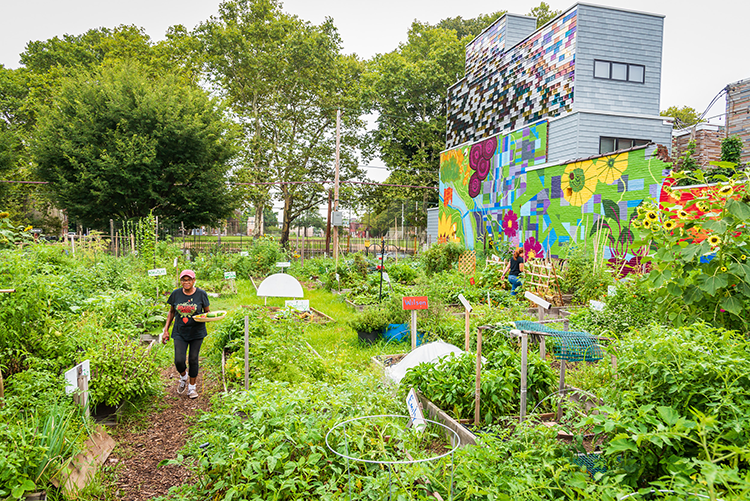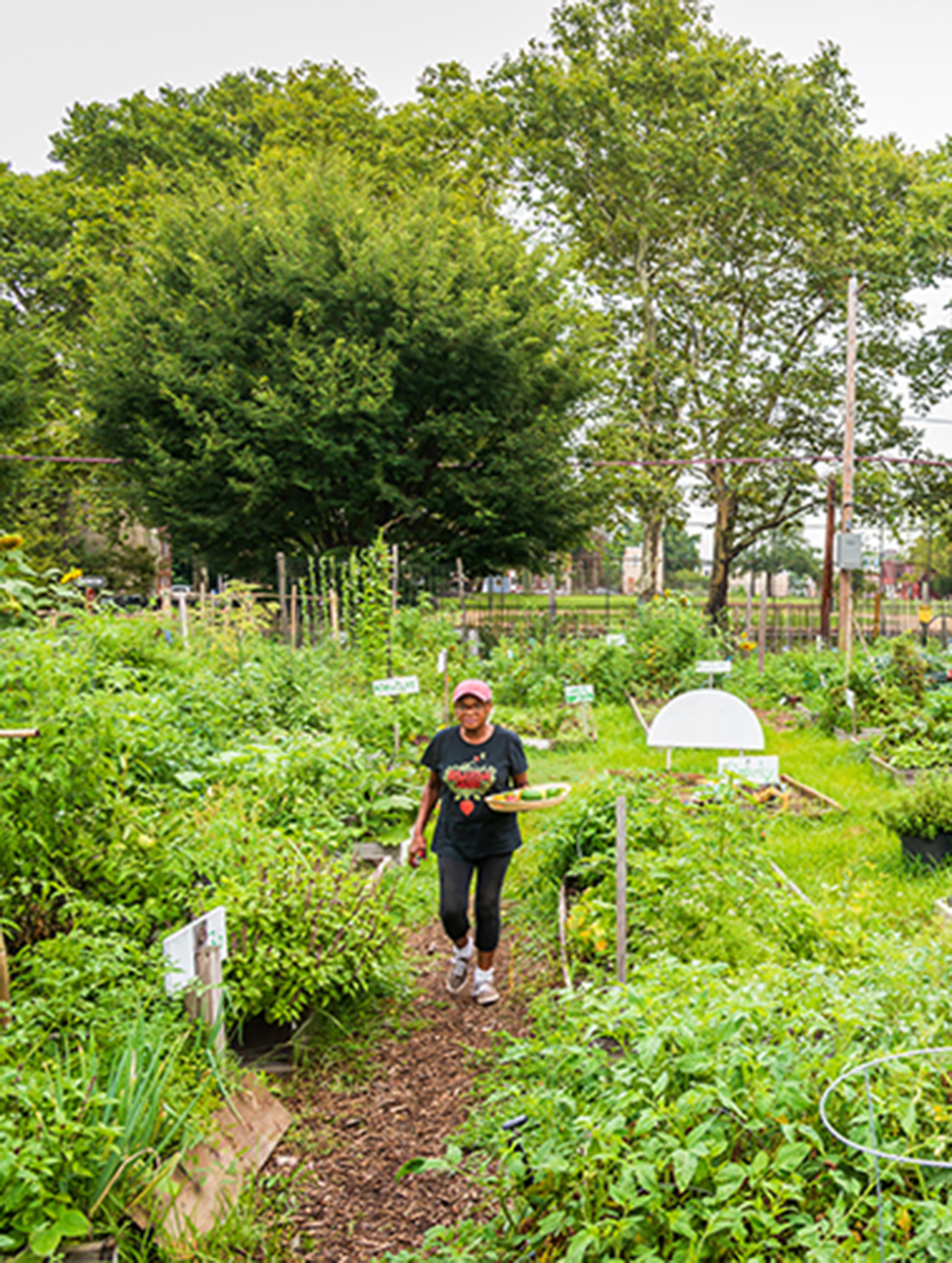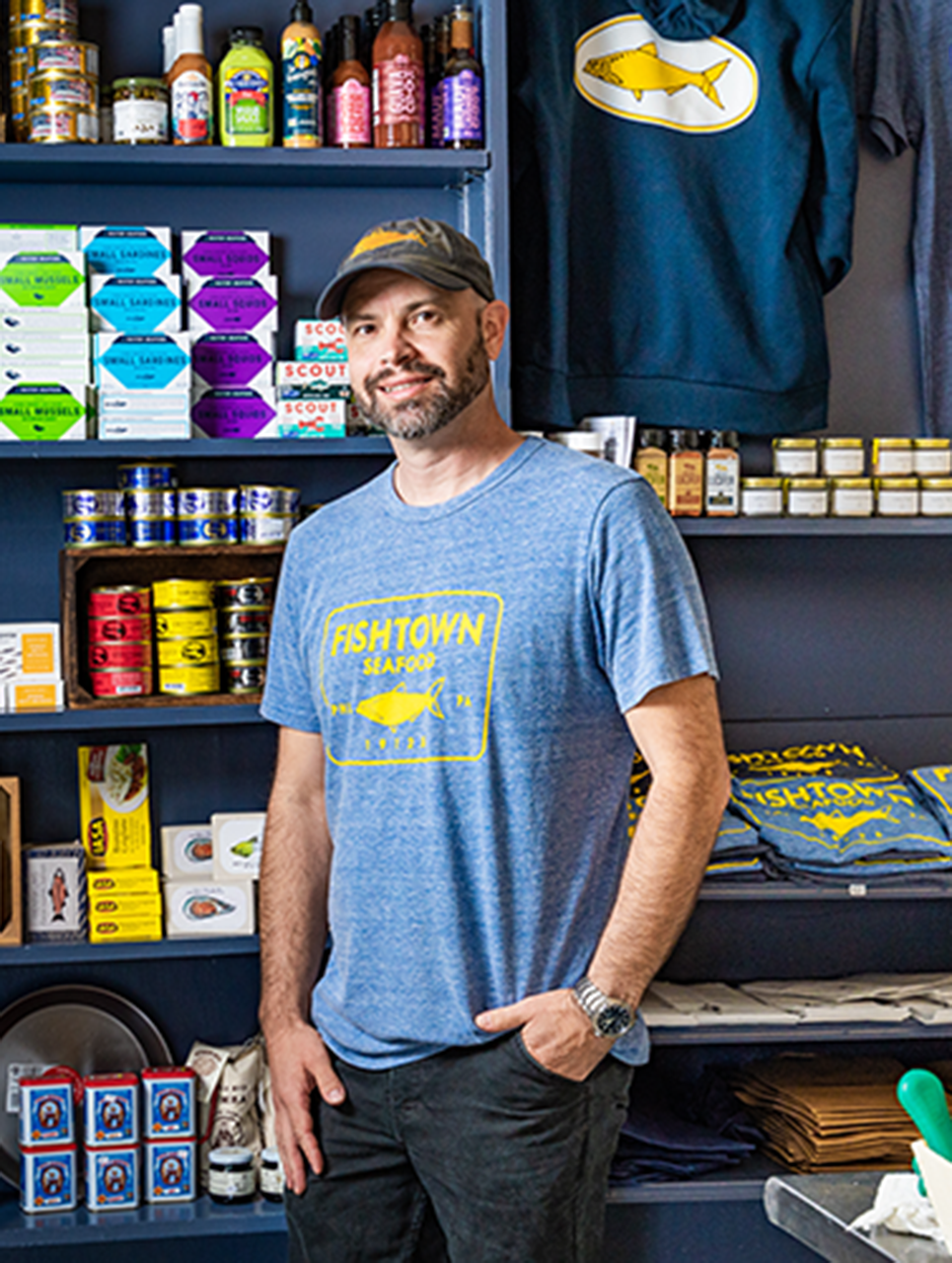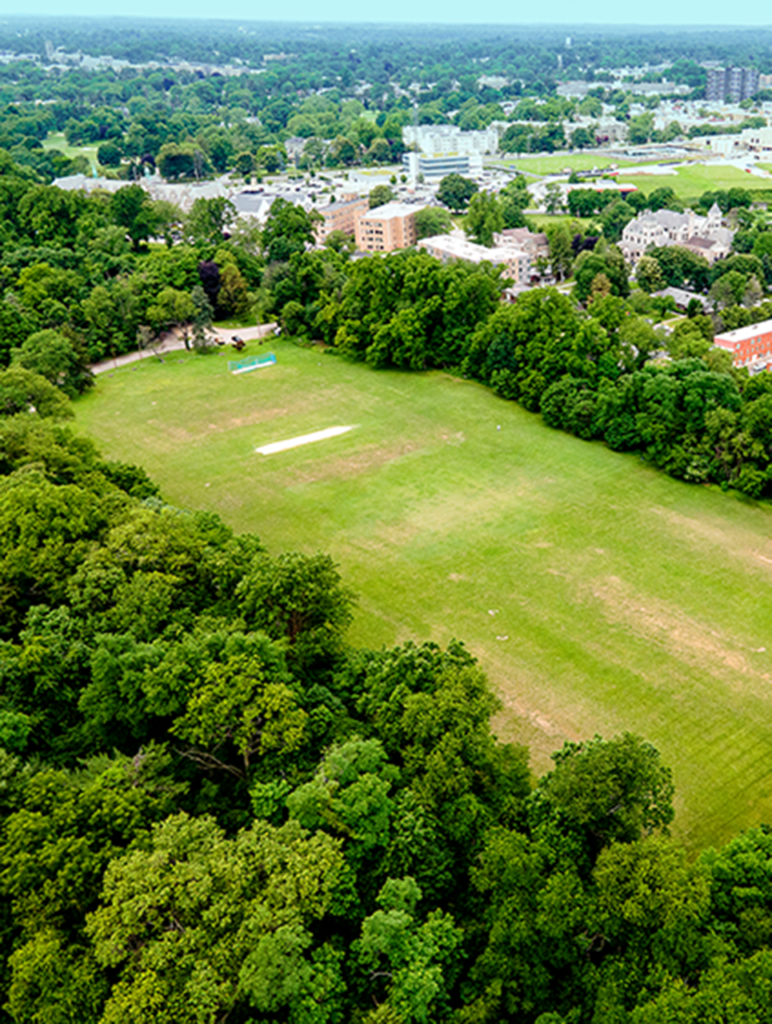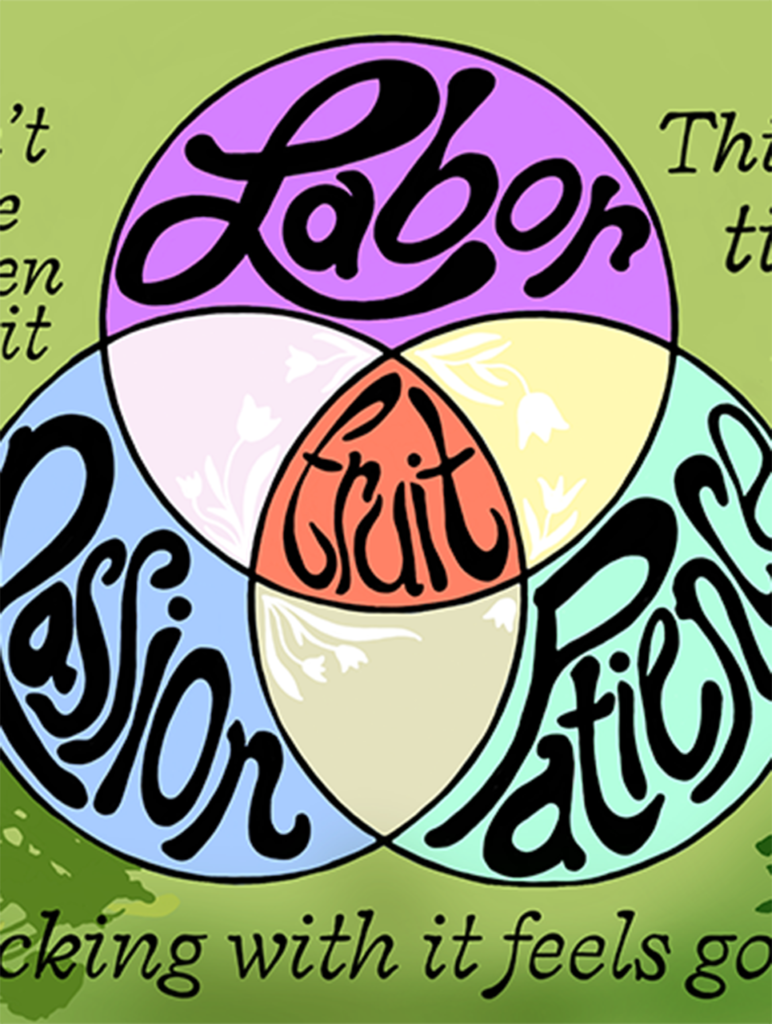You’d think that after protecting 50 gardens, the process would get easier. But for the Neighborhood Gardens Trust (NGT), a nonprofit tasked with preserving gardens, securing each parcel of land is a unique challenge.
This spring NGT and members of Brewerytown Garden at 27th and Master streets celebrated the protection of some of the garden’s key lots. The Brewerytown Garden comprises six lots that were once vacant but are now critical community and growing space. Four of those lots were publicly owned and protected through Philadelphia Parks & Recreation’s Farm Philly program. But, like many gardens in Philadelphia, the deeds for two lots were held by owners who had long abandoned them. This often proves disastrous for community gardens.
Two years ago, the privately owned lots were put up for sale. After an appeal from the Brewerytown Garden leadership, NGT was able to identify funding through the Pennsylvania Department of Community & Economic Development’s Greenways, Trails and Recreation Program, which was matched through the Brewerytown community’s fundraising to purchase those lots and permanently protect them.
“I think it’s beneficial to the garden because they get the benefits of being a Farm Philly garden,” explains NGT executive director Jenny Greenberg. “And there are other supports that come through NGT and Pennsylvania Horticultural Society that they’ll be able to access as well. So I think it’s a win-win.”
This situation was not unlike what NGT faced at the Growing Home Garden on the 700 block of Emily Street in South Philadelphia. The garden, organized by the nonprofit immigrant and refugee organization SEAMAAC, serves more than 100 families primarily from Nepal, Bhutan and other South Asian countries. Just like in Brewerytown, NGT and the Growing Home Garden leadership faced a complicated land situation.
Some lots were protected through Parks & Recreation, and several parcels were privately held and tax delinquent. Although NGT and the gardeners were working diligently to acquire the land through the Land Bank, a developer was able to acquire one of the lots that was right in the middle of the garden. NGT was able to work with the City and Councilmember Squilla’s office, however, to identify a nearby City-owned parcel of equal value and swap it with the developer. “This is an example of another situation where the real estate development activities happen so quickly within certain neighborhoods and real estate markets that the key is getting multiple stakeholders and partners on the same page and moving in the same direction and lifting up land protection as our shared priority,” says Greenberg of the process. “What I feel very proud of is that NGT has been strategic and creative and nimble at finding the right solution at the fastest pace we can to the endless variety of challenging land tenure situations.”
This work shapes land use and livability in Philadelphia neighborhoods for generations to come. So the investment now has a very long-term impact.”
— Jenny Greenberg, executive director of Neighborhood Gardens
One of those major challenges was covered extensively in Grid #153, February 2022. Back in the 1990s the Rendell administration made what is now widely viewed as a shortsighted and disastrous decision to sell more than 30,000 tax liened properties to U.S. Bank in exchange for a quick influx of cash for the beleaguered school district. Since then, U.S. Bank and the law firm Linebarger Goggan Blair & Sampson have sold a majority of these properties primarily through sheriff’s sales, and scarcely 2,000 properties remain. Some of these properties, however, are in existing community garden spaces. Since they are tax liened by a third party, they can’t be put into the Land Bank, which is necessary for NGT to acquire the land.
As we reported, U.S. Bank tax liened properties in the Cesar Andreú Iglesias Community Garden (known as the Iglesias Gardens) in North Philadelphia were in jeopardy. Leaders of the garden with NGT made an appeal to the Kenney administration to buy back the remaining liens to protect these gardens. Kenney administration spokespeople called the buyback of these liens “financially unrealistic,” but did state that the administration was willing to entertain purchase of individual lots — a piecemeal offer that Linebarger has refused on behalf of U.S. Bank.
The issue of the U.S. Bank tax liened properties persists, affecting lots like the ones in the Viola Street Community Garden in the East Parkside neighborhood, where gardeners have been growing vegetables for over 50 years. This prompted Councilmember Kendra Brooks in May to launch the “Restore Community Land” campaign, which, among many things, proposes allocating $10 million in Philadelphia’s 2023 City budget toward buying back the liens on 500 properties that house community garden space or established side yards as well as 475 properties that could be used for affordable housing. A May Philadelphia Inquirer article indicated that Linebarger was willing to entertain this deal, although the Kenney administration still balked at the price tag, stating that “the City has limited resources and dedicating $10 million to this would impact our ability to fund other priority projects.”
“I think that Linebarger’s past refusal to look at a subset of the liens was really an obstacle,” says Greenberg. “So I’m pleased that they are now willing to do that and I think that Councilmember Brooks’ leadership as well as other advocates like the Public Interest Law Center, Iglesias Gardens, Soil Generation and PHS as well as other councilmembers like Jamie Gauthier have done a very strategic job of coming up with a list and sharing information to make sure that it’s inclusive of all of the community gardens, as well as many spaces that are being managed and stewarded by community members.”
Despite this newfound energy and leadership to find a solution to the U.S. Bank tax liened properties, lots throughout Philadelphia continue to be sold through sheriff’s sale at a rapid rate, and the assembling of a collection of lots owned by multiple entities continues to be a challenge. Councilmember Brooks’ leadership was critical, but Greenberg and NGT still see a need for the Kenney administration and future mayoral administrations to exert more control over the future of the land use. Piecemeal losses of land to speculators through things like online sheriff’s sales, where developers from other cities (or other countries) bid on properties, is exacerbating Philly’s land inequity.
“When the Neighborhood Gardens Association started in the 1980s, a lot of gardens just stayed under the radar without legal land tenure and did their thing since the imminent threat of being lost to development or real estate speculation was much less,” Greenberg explains, using NGT’s former name. “But when we relaunched in 2014 as the Neighborhood Gardens Trust with support from PHS, I was hired explicitly to meet the growing need and opportunity to expand protection to many more gardens that were in increasing jeopardy of being lost.”
Indeed, the Neighborhood Gardens Association, founded in 1980, saved 30 gardens over the course of 33 years. NGT has saved 20 since 2014. Their support has extended beyond land acquisition; they have invested, in partnership with PHS, over $1.2 million in garden infrastructure such as water lines, raised beds and picnic tables to amplify the community benefits of the preserved spaces.
NGT is currently working with an additional 20 gardens that they are looking to protect in the coming years, coordinating partners, the City, the State, donors and supporters to piece solutions together.
“I think we’ll be at it for a while,” Greenberg admits. “This work shapes land use and livability in Philadelphia neighborhoods for generations to come. So the investment now has a very long-term impact.”
